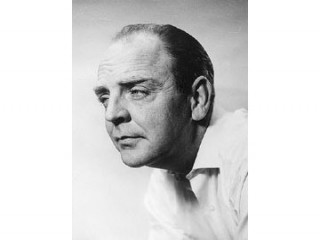
William Inge biography
Date of birth : 1913-05-01
Date of death : 1973-06-10
Birthplace : Independence, Kansas, United States
Nationality : American
Category : Famous Figures
Last modified : 2011-11-25
Credited as : playwright, novelist, Pulitzer Prize
0 votes so far
Born on May 3, 1913, in Independence, Kansas, William Motter Inge was the youngest of five children. He would get his first taste of the theatre at an early age. The local boy scout troupe, of which Inge was a member, held its weekly meetings in a Civic Center which boasted a 2000 seat theater, and the boys were often invited to sit in the balcony after their meetings and watch the touring shows which passed through town for one night stands on their way from Kansas City, Missouri to Tulsa Oklahoma.
The small town of Independence had a profound influence on the young Inge, and he would later attribute his understanding of human behavior to growing up in this small town environment. "I've often wondered how people raised in our great cities ever develop any knowledge of humankind. People who grow up in small towns get to know each other so much more closely than they do in cities." Inge would later use this knowledge of small town life in many his plays, most of which revolve around characters who are clearly products of small towns just like Independence.
Inge was educated at the University of Kansas at Lawrence where he graduated with a Bachelor of Arts Degree in Speech and Drama in 1935. After graduation and a brief attempt at post graduate studies, he worked a variety of jobs including highway laborer, news announcer, and high school teacher, before returning to school and earning a Master of Arts Degree from the George Peabody College for Teachers in 1943. Upon earning his Masters, Inge moved to St. Louis, Missouri, where he landed a job as the drama and music critic for the St. Louis Times. During the course of his duties at the Times, Inge was fortunate enough to come into contact with Tennessee Williams who invited the young critic to attend with him a production of The Glass Menagerie. Inge was so inspired by Williams' play that he decided to try his hand as a playwright. After completing his first script, Farther Off from Heaven (1947), Inge sent a copy to Williams who recommended it for production. The play was produced by Margo Jones in Dallas, Texas.
Inge's next literary effort, Come Back, Little Sheba (1950) earned him the title of "most promising playwright of the 1950 Broadway season", but his career was only beginning to gain momentum. He followed this success with Picnic (1952) which won him a Pulitzer Prize, the Drama Critics Circle Award, the Outer Circle Award, and the Theatre Club Award. Next came Bus Stop (1955) which he would later adapt into a popular film starring Marilyn Monroe, and two years later, The Dark at the Top of the Stairs (1957), a reworking of his first play, premiered on Broadway. This somewhat autobiographical drama would come to be considered Inge's finest play. He would later describe it as his "first cautious attempt to look at the past, with an effort to find order and meaning in experiences that were once too close to be seen clearly."
By this time, critics were hailing Inge as another Tennessee Williams or . Unfortunately, his later works would not fulfill that promise. The Dark at the Top of the Stairs was followed by a string of box office failures including A Loss of Roses (1960), Natural Affection (1963), Where's Daddy? (1966), and The Last Pad (1970). Inge's only real sucess during this period was his screenplay for Splendor in the Grass (1961) for which he won an Acadamy Award. Convinced that he could no longer write, the small town Inge fell into a deep depression, and on June 10, 1973, at his home in the Hollywood Hills, William Inge took his own life.
Author pf plays:
The Dark at the Top of the Stairs
Eleven Short Plays
Four Plays: Come Back, Little Sheba/Picnic/Bus Stop/The Dark at the Top of the Stairs
A Loss of Roses
Natural Affection
Picnic
Splendor in the Grass
Where's Daddy
















